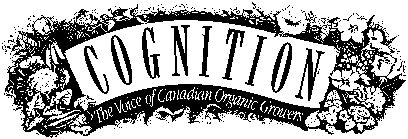

Cognition Index | Virtual Library
| Magazine Rack
Search
| Join the Ecological Solutions Roundtable
GLEANINGS
by Ann Cleary
Sustainable development and sustainable agriculture are much written about and discussed these days. Curiously, the terms seem diametrically opposed to each other, arrived at from different motivations.
The source of development seems to be economic and extractive, giving average benefits to the people and large rewards to the developers who use the environment for entertainment and gain. Trails for riding, hiking, skiing and snowmobiling; campgrounds; resorts; golf courses – all are designed with long-term use and profitability in mind.
Sustainable agriculture, on the other hand, is a collaborative effort between farmers and the planet to provide nourishment for the human species. Recycling and conserving, without using non-renewable resources, preserve the planet for generations to come.
Given that most development plans do not include sustainable, i.e. organic, agriculture in long-term plans, how then do we formulate plans and put sustainable agriculture in place?
To gain acceptance for organic systems we must first document the weaknesses of conventional methods. These are turning agriculture into a factory-type industry which will become more mechanized, computerized and robotized as time goes on. Techniques previously used by the military in warfare were turned on agriculture after World War II and Vietnam leading to soil, water and air pollution.
Pests are indicators (just as weeds, for instance, are indicators of soil), not enemies to be killed. This attitude that we have the right to conquer nature is the wrong approach. In fact, time has proven that pests have developed resistance to pesticides and have learned how to fight back.
Conventional farming uses too much energy and too many non-renewable resources. Factory farms are too narrowly focused and lack the biodiversity which is so essential to the environment.
All the organic/sustainable organizations must pull together and speak with one voice to be heard. There are many variations of the organic theme, such as ecological farmers, biodynamic farmers, permaculture enthusiasts and so on, but we all have the same basic ideas and principles.
No article on sustainable agriculture can be written without mention of the 16 years’ research being carried out by the Land Institute in Salina, Kansas and its report of findings (Winter/94). Motivated by Wes Jackson [New Roots for Agriculture, 1980], the report gives details of the long search for perennials that can produce high seed yield. Wes Jackson says that ultimately, agriculture comes out of nature, and agriculture has to be considered in terms of ecosystems. His polyculture design for sustainable agriculture on the prairies can be adapted to other ecosystems. The report is available from the COG lending library.
Copyright © 1995. Ann Cleary
Reprinted with permission. All rights reserved.
Info Request | Services | Become EAP Member | Site Map
Give us your comments about the EAP site
Ecological Agriculture Projects, McGill University (Macdonald
Campus)
Ste-Anne-de-Bellevue, QC, H9X 3V9 Canada
Telephone:
(514)-398-7771
Fax:
(514)-398-7621
Email: info@eap.mcgill.ca
To report problems or otherwise comment on the structure of this site, send mail to the Webmaster